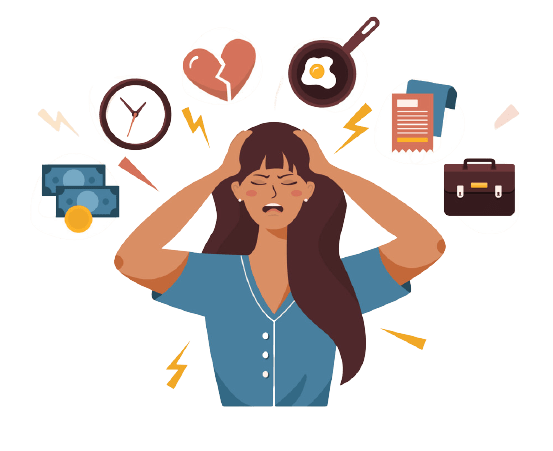Online Phobia Therapy | Best Therapist for phobia help
- Set up a free & confidential chat on your phobia
- Unlimited help through phobia self-care app
- Live Video or Chat sessions with top phobia therapists
Begin Therapy
Consult online with best Therapist
Get the best help for phobia
TherapyMantra is here to help you on your path to recovery from phobias. We match you with the best phobia therapists available 24/7 via video call or messages.
Match with phobia Therapists
We assign the best counselors experienced in phobias based on your needs.
Affordable and Effective
Our online sessions are 90% less expensive than in-person therapy, available 24/7.
Self-Care for phobias
We offer ongoing phobias support through self-care tools, phobias help videos, chat groups, meditations, breathing exercises, and other resources.

Wondering if it’s just a phase or something more? Take our Free online phobias test to find out?
How it works?
You are matched with a phobia counselor based on your needs and preferences. You get a secure “therapy room” where you can communicate with your counselor via chat or phone. You can write or talk about phobias & ask questions to deal with the phobia.

Register for phobia Counseling
Simply complete a 5-minute online form to tell us about your phobias

Consult with your phobia Therapist
We connect you with phobias counselors who are available 24/7 based on your preferences and needs.

Connect to Our App
Apart from Video/chat sessions, our app offers self-care tools, videos, and meditations to help you deal with your phobia.
Best phobias Therapists
Positive conversations, exercises, and meditations are used by TherapyMantra psychologists to help you deal with the phobia. Our phobia therapists outperform traditional counseling as you get matched from a pool of 500+ phobia counselors, who offer 24/7 unrestricted private chat.








What is a phobia?
Phobias are irrational fear of an object or situation. People with phobias often experience a sense of terror and dread that can interfere with their daily lives.
Phobias are one of the most prevalent mental illnesses. Approximately 12.5 percent of people in the United States will have a specific phobia at some point in their lives. Women are more likely to be afflicted with phobias than males. Nausea, trembling, accelerated heart rate, feelings of unreality, and being preoccupied with fear are common symptoms of a phobia. In some cases, the person is aware that their fear is irrational, yet they still feel it. Phobias may be related to past traumatic events or stressful situations in one’s life.
If you think you may have a phobia, it is important to seek help from a professional. Ignoring the problem will only make it worse.
Types of phobia
Some common fears and phobias are:
- Ablutophobia – Fear of bathing or washing. Typically items from the fear that one will be swept away by the water while showering or that one will drown in a bathtub.
- Agliophobia – Fear of pain. This often presents as an intense fear of injury. Agliophobia can pose a serious problem in that many injuries or necessary medical care require painful procedures, such as surgery or the extraction of teeth.
- Agoraphobia – Fear of open spaces, crowds, and public places. Many people with agoraphobia suffer panic attacks when they are exposed to these situations, which can cause them to become isolated and afraid to leave their homes.
- Alektorophobia – Fear of chickens. This phobia is rare but does occur in some people. Those with alektorophobia may be repulsed by the appearance or sound of chickens or may fear that they will contract a disease from the birds.
- Anglophobia – Fear of anger or rage. People with agoraphobia often worry that they will lose control and become violent when angered. This can lead to significant anxiety and avoidance in social situations.
- Anthophobia – Fear of flowers. This phobia is relatively common and can stem from a belief that flowers are too beautiful and delicate to be touched, or that they contain poisons. Flowers may also make some people sneeze, which leads them to believe the flowers are “contagious”.
- Astraphobia – Fear of thunder and lightning. This phobia is not as common as many others but can cause significant distress for those who suffer from it. People with astraphobia are often acutely aware of the weather conditions and may worry when they see storms approaching.
- Chirophobia – Fear of hands. This phobia is relatively rare but does occur in some people. Many people associate hands with germs and disease, which can lead to a fear of hand contact.
- Chrometophobia – Fear of money. This phobia is relatively rare but does occur in some people. People with chrometophobia may be afraid to touch or handle money and may feel anxious when they are near it.
- Social phobias – fear of social or performance situations, where the person fears they will act in an embarrassing or humiliating way (e.g., public speaking)
Treatment options for phobia
Therapy, meditation, medication are the key ways through which you can treat your phobia:
Therapy
If you have phobia symptoms that last for two weeks or longer, you should consider seeing a therapist who specializes in phobia therapy. The majority of people who seek phobia therapy report that when their symptoms began to interfere with their ability to function on a daily basis, they realized it was time to seek professional help.
Meditation & Mindfulness
Mindfulness activities and meditations that help with phobia include loving-kindness meditation, mindfulness meditation, breath awareness meditation, transcendental meditation, visualization, and body scan meditation.
Medication
Medication is an excellent treatment for phobia. This has existed since the 1950s, and one type of it is known as SSRIs. They are used to treat anxiety, panic disorder, obsessive-compulsive disorder, social phobia, and premenstrual dysphoric disorder, also known as PMDD.
Antidepressants
Antidepressants work by altering brain chemicals known as neurotransmitters, which influence your mood. A neurotransmitter is a type of chemical that regulates sleep, appetite, and sexual desire. When people are depressed, their levels of chemicals are lower than they should be. When used as directed, SSRIs are not addictive. When taken over time, they have few side effects. As a result, if someone is unable to function without treatment, they can be used to treat the phobia.
How can therapy help with phobias?
A phobia isn’t something you can just get over; it’s a complex, potentially life-threatening condition caused by a variety of factors. a phobia is rarely cured by a single treatment method, such as medication. While some people can manage their phobia on their own, a therapist for phobia near you can provide invaluable insights and a variety of innovative, personalized treatment options that often result in far better outcomes than their patients could achieve on their own.
Therapy can assist you in identifying what is causing your phobia. phobia therapists use a variety of safe, non-invasive techniques to assist you in processing thoughts, feelings, and experiences that may be related to your symptoms. Physiological issues that can trigger depressive symptoms are also explored by therapists, and psychiatrists may prescribe antidepressant medications to be used in conjunction with talk therapy.
Therapy options for phobia
CBT
One of the different types of psychotherapy. The type of therapy aims to change patterns in order to affect changes in moods and behaviors. CBT is a hybrid of bot, cognitive, and behavioral therapy. The therapist attempts to identify negative and unhealthy thought patterns and assists the patient in developing behavioral responses to difficult and stressful situations.
Counseling and psychoeducation
This is a very effective pharmacological treatment for phobia and is considered the best for treating phobia.
Expressive Arts Therapy
Art therapy, also known as creative expression therapy, can help you overcome phobias. Art is a very potent and healing tool. Because it is a great form of expression, it is thought that creation can treat the phobia. One can express his or her thoughts, emotions, and ideas.
Dialectical Behavioral Therapy (DBT)
It is a variant of cognitive-behavioral therapy. It also helps patients who are depressed, even if their behavior is destructive. It is based on four skill modules, which are as follows:
- Mindfulness
- Tolerance for stress
- Emotional control
- Effective interpersonal communication.
Aspects of Acceptance and Commitment Therapy (ACT)
The therapy tries to understand an individual’s tendency and makes them realize the value and vitality of life. It does not simply try to change or eliminate unwanted and stressful thoughts and feelings. Rather, it attempts and teaches the formation of new and compassionate bonds through the same experiences.
How to find a phobia therapist?
TherapyMantra can help you find a phobia therapist near you. We have over 500+ therapists listed on our therapist directory. You can follow the following steps to find a good phobia therapist:
- First, ask your family doctor or anyone else you are seeing for a referral for a phobias therapist.
- The next thing you’ll want to do is ask your friends and loved ones for referrals.
- The next thing you’ll want to do is look online. There are many websites that help people find therapists in their area who can treat things like phobias.
10,000+ Happy & Healed patients

“After years of dealing with phobia issues, Therapy Mantra assisted me in releasing a lot of buried emotions and getting rid of fears. I had previously received phobia counseling, which helped, but Therapy Mantra was able to turn me around and make me look forward to a better life.
”
Kevin,
1 year on TherapyMantra
FAQs
Cognitive-Behavioral Therapy (CBT). CBT assists people in understanding how deeply ingrained habitual patterns of thinking and responding to stress, phobia, and anxiety may be preventing them from living the fulfilling life they deserve.
Licensed psychologists are highly trained mental health professionals who have assisted patients in recovering from a phobia. Several different approaches to psychotherapy have been shown to aid in the recovery of individuals suffering from a phobia, particularly those suffering from mild to moderate phobia.
Consider sertraline and escitalopram as first-line treatments for adults suffering from a major phobia. Bupropion, fluoxetine, paroxetine, and duloxetine were the least tolerated antidepressants in this study.
According to research, phobia does not result from having too much or too little of certain brain chemicals. Instead, there are numerous potential causes of phobia, such as faulty mood regulation by the brain, genetic vulnerability, stressful life events, medications, and medical problems.
Cognitive-behavioral therapy, interpersonal therapy, and psychodynamic therapy are three of the most commonly used methods in the treatment of phobia. A hybrid approach is frequently used.
Phobia not only makes a person feel sad and depressed; it can also permanently damage the brain, causing difficulties remembering and concentrating once the disease is gone. Up to 20% of angry patients never recover completely.


